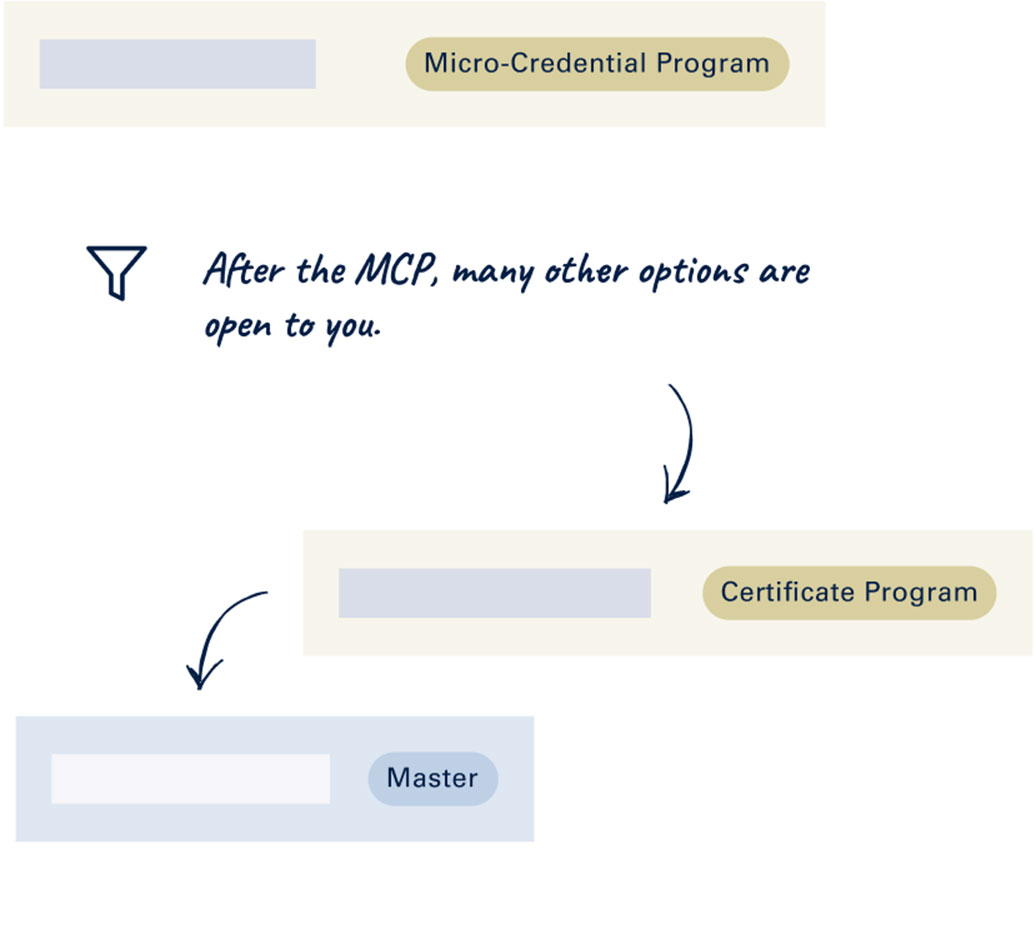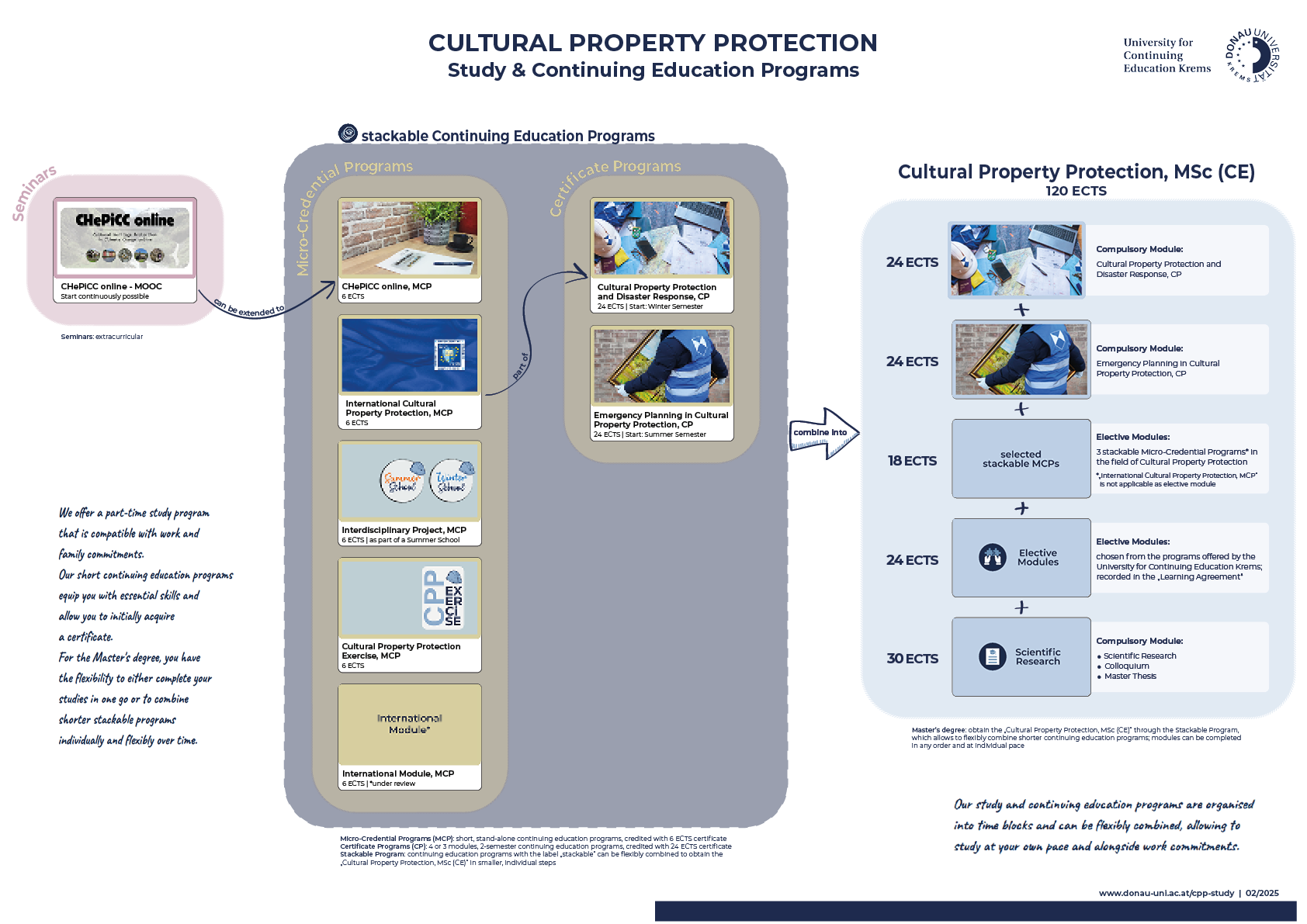-
Graduation
Master of Science (Continuing Education) - MSc (CE)
-
ECTS-Points
120
-
Learning format
-
Duration
6 semesters, part time
-
Start
continuously possible
-
Admission requirements
According to curriculum
-
Language
English
-
Curriculum
Subject to Senate approval
/StudyPages_Header_Master.jpg/jcr:content/StudyPages_Header_Master.jpg)
Peacetime preparedness is a key component of ensuring the protection of cultural heritage in the event of a disaster. Students learn to identify risks and develop appropriate protective measures. Over six semesters, the program prepares students for professional requirements and provides an international perspective, enabling them to engage in cultural heritage protection worldwide.
You can obtain the Master's degree "Cultural Property Protection, MSc (CE)" as part of our Stackable Program, where various continuing education programs (Certificate Programs, Micro-Credential Programs) can be individually combined.

The preparation for evacuation and emergency measures in peacetime - before a disaster strikes - is a concept emphasised in the 1954 Hague Convention and is a central element of the practical "Cultural Property Protection, MSc (CE)" program.
Ass.-Prof. Mag. Dr.
Anna Maria Kaiser
Study Program Director – Center for Cultural Property Protection
Any questions?
We’re here to help.

Ass.-Prof. Mag. Dr.
Anna Maria Kaiser
Study Program Director
Or contact us directly.
Benefit from our study program
- The continuing education master's program combines various disciplines and enables students to develop comprehensive protection strategies for cultural heritage and to gain a deep understanding of the diverse aspects of cultural property protection.
- By engaging in practical exercises, research-based projects with museums and heritage sites, and collaborating with international organisations in authentic disaster scenarios, you will be optimally prepared for professional challenges. This approach provides valuable insights that extend well beyond theoretical knowledge.
- The "Cultural Property Protection, MSc (CE)" program takes a holistic approach, focusing on the analysis of current man-made and natural hazards and threats to cultural heritage.
-
interdisciplinary
-
practice-oriented
-
innovative teaching methods
Design your individual Master
Curriculum
The "Cultural Property Protection, MSc (CE)" can either be completed part-time in one go within 6 semesters, or by flexibly combining our stackable continuing education programs without a fixed timeframe. (→ The individual stackable continuing education programs must be completed within the specified time schedule)
! Currently, the "Cultural Property Protection, MSc (CE)" can only be obtained by combining stackable programs.
The "Cultural Property Protection, MSc (CE)" comprises a total of 120 ECTS credits:
- 2 Compulsory Modules - 48 ECTS:
The Certificate Programs "Cultural Property and Disaster Response, CP" and "Emergency Planning in Cultural Property Protection, CP" - 3 Elective Modules in the field of Cultural Property Protection - 18 ECTS:
to be chosen from our range of Micro-Credential Programs - Elective Modules - 24 ECTS:
to be chosen from the programs offerings of the University for Continuing Education Krems - Compulsory Module Scientific Work & Master's Thesis - 30 ECTS
Of the MCPs listed here, each worth 6 ECTS credits, modules worth a total of 18 ECTS credits must be completed.
-
Contents
This MCP is currently under review.
The module will take place as part of a Summer School. -
Contents
This MCP is currently under review.
The module will take place as part of a Cultural Property Protection Exercise. -
Contents
This MCP is currently under review.
A selection of modules from the range of programs offered by the University Continuing Education Krems at NQR 7 level for a total of 24 ECTS credits. The selection must be recorded in a 'Learning Agreement' during the admission interview.
-
Contents
- Scientific Research
- Master Thesis
- Colloquium
All modules of the "Cultural Property Protection, MSc (CE)" can be completed in any order (unless prerequisites are specified on the respective program page).
With the Micro-Credential Program "CHePiCC online, MCP" (elective module), which is independent of time and place, the start of the master's program is continuously possible.
The compulsory module "Cultural Property and Disaster Response, CP" starts every winter semester, while "Emergency Planning in Cultural Property Protection, CP" starts every summer semester.
The elective modules "Interdisciplinary Project" and "Cultural Property Protection Exercise" are offered as MCPs within our Summer Schools and Cultural Property Protection Exercises and are integrated into research-based projects. They are typically offered once a year as unique thematic programs.
With our Stackable Program, you can combine our continuing education programs flexibly in terms of time and finances, allowing you to obtain your master's degree later.
Downloads
Study Program Director
The study program director is Anna Kaiser, Assistant Professor and Head of the Center for Cultural Property Protection. Her research themes predominantly orbit around the protection of cultural property, integrating a multidisciplinary approach that spans ancient history, military studies, and contemporary strategies for safeguarding heritage. Her methodological expertise lies in combining historical analysis with practical military training, emphasizing the application of strategies for protecting cultural heritage in conflict zones and disaster-prone areas.
The faculty of the "Cultural Property Protetion, MSc (CE)" consist of a large number of renowned international experts from various disciplines with civilian and military backgrounds. They are all involved not only in theoretical and applied research but also in the practice of cultural heritage protection. This ensures that the latest state of research and knowledge is conveyed.
Stackable Program

The Stackable Program allows you to break down the "Cultural Property Protection, MSc (CE)" into smaller, flexible steps. The shorter continuing education programs of the Center for Cultural Property Protection, labeled as Stackable Program (Micro-Credential Programs & Certificate Programs), allow you to tailor your studies to your personal needs, interests, and career goals.
Application
Admission requirements
- university entrance qualification (or equivalent training at least at NQF level IV)
- appropriate knownledge of English
- successful completion of an interview with the study program director
Application process
- Contact us to clarify your expectations of the study program and to check the admission requirements
- Online application via the online tool of the University for Continuing Education Krems (UWKonline)
- Carrying out the interview with the study program director
- Admission to the study program
Are you interested in the "Cultural Property Protection, MSc (CE)"?
Please get in touch!
Tags

